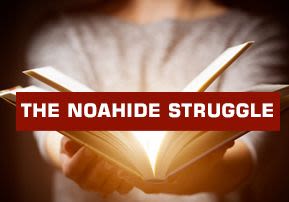
Join Facebook Group | Like Facebook Page
Subscribe To Youtube | Support Me On Patreon
SIGN THE PETITION
http://chng.it/yXcvjMZk
VIDEO TO THIS ARTICLE
Subscribe To Youtube | Support Me On Patreon
SIGN THE PETITION
http://chng.it/yXcvjMZk
VIDEO TO THIS ARTICLE
After hearing about the Noahide Laws, many non-Jews begin to fret that somehow, some way, Jews will find a way to force non-Jews to comply with the Noahide Laws. Noahide apologists will often respond to this by saying that Jew have no obligation to force non-Jews to follow the Noahide Laws, and it would only be up to a non-Jewish society which has accepted the Noahide Laws to exact the death penalty. You will notice that almost everything in Noahidism is up for interpretation, and yes Rabbis disagree as to whether or not Jews are obligated to force non-Jews to follow Noahide Laws. Professor Nahum Rakover teaches at Bar-Ilan University in Israel. In his book "Law and the Noahide", Rakover demonstrates that according to the great and respected Jewish legal scholar Maimonides, Jews are certainly obligated to force non-Jews to comply with the Noahide Laws. Rabbi Menechem Mendel Schneerson who is said in Public Law 101-267 to be the leader of world Jewry (here) and a fierce proponent of the Noahide Laws, agrees with these sentiments that Jews should use "force" (and if not pleasantry) to enforce the Noahide Laws on non-Jews (here). Please notice in the text below that Rokover begins the discussion with Noahide non-Jews who live inside the land of Israel (ger toshavs), however he makes it clear that these same values of enforcing Noahide law upon non-Jews applies to non-Jews living outside the land of Israel as well. Jews and Noahides only give us the most liberal interpretations of the Noahide Laws, liberal interpretations which are refuted by heavy weights in the word of Judaism and Noahidism, names like Maimonides and Schneerson.
http://www.daat.ac.il/daat/vl/noahides/noahides01.pdf
LAW
and the
NOAHIDES
LAW AS A UNIVERSAL VALUE
By
Prof Nahum Rakover
Chapter 7
JURISDICTION OVER
NON-JEWS
Are Jews obligated to enforce the observance of the Noahide obligation of dinim? Such association might bear on the appointment of judges for non-Jews, sanctions against non-Jews for failure to appoint judges, and punishment of non-Jews for violations of Noahide law.
Maimonides rules clearly[234] that an obligation does exist to appoint judges for resident aliens (ger toshav)
to judge them according to [Noahide] laws, in order that the world not be destroyed. And the court is permitted to decide for itself whether to appoint Jewish or non-Jewish judges.[235]Maharam Shik, one of the Later Authorities, concludes that there exists an obligation for Jewish courts to judge non-Jews for their violations. He reasons that with regard to the punishment of transgressors it is impossible to draw distinctions, and that if non-Jewish violators are not punished, Jews may ultimately suffer: [236]
In any case, it appears to me that anything that involves dealing with transgressors, even if they are descendants of Noah, is our concern, for others will learn from any evil done in public and follow suit, and in the very least, the sight of the commission of evil is harmful to the soul. Thus, in trying them, we are protecting ourselves. In any case, it is inconceivable that any person living among the residents of a given city be beyond the jurisdiction of the court.This may well be the intent of Maimonides in the passage just cited when he explains the obligation to appoint judges with the words, "that the world not be destroyed." [237]
With regard to descendants of Noah who are not resident aliens, Maimonides' definition[238] of dinim requires some clarification:
What is meant by the commandment of dinim? That [Noahides) are obliged to appoint dayyanim and shofetim[239] in every district[240] to adjudicate matters concerned with the other six [Noahide] commandments and to caution the people.[241] And a descendant of Noah who violates any of these seven commandments, is put to death by the sword. This is why the residents of Shekhem [see Gen. 34] were deserving of death, for Shekhem had been guilty of robbery, and they witnessed the incident and did bring him to justice. [242]What is meant by "obliged to appoint dayyanim and shofetim"? Why does Maimonides use both terms when elsewhere, [243] with reference to Deuteronomy 16: 18, he notes that their meaning is identical?
It is a positive biblical commandment to appoint judges [shofetim] and officers in every country and every district, as is written (Deut. 16:18), "Judges and officers shall you appoint in all your gates." Shofetim, these are the permanent dayyanim of the court, before whom litigants appear.Also, what does "put to death by the sword" mean? Is a Jewish court obliged to administer punishment? Or is it optional, the obligation to administer punishment devolving only upon the descendants of Noah themselves?
Nahmanides[244] understands Maimonides to mean that Jewish courts are obliged to try descendants of Noah. Regarding the incident of Shekhem (Gen. 34), he writes, [245] "Many have asked how the righteous sons of Jacob could spill innocent blood." In response, he cites the passage from Maimonides quoted above
No comments:
Post a Comment